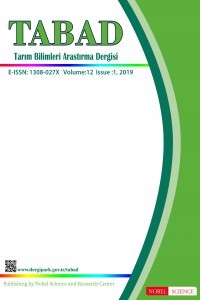Kuraklık Koşullarında Nano Besin Maddeleri Priminginin Tritikale (Triticosecale wittmack) Tohumunun Biyolojik Özelliklerine Etkisi
Bu denemede kuraklık koşulunda nano besin maddeleri ile primingin tritikale tohumunda çimlenme özelliklerin belirlenmesi amaçlanmıştır. Deneme Tesasdüf Blokları Deneme Deseni şeklinde ve 3 tekrarda Urmia Üniversitesi Ziraat Fakültesi Tarla Bitkileri Bölümünde 2015 yılında yapılmıştır. Denemede ilk faktör kuraklık 5 seviyede (0, -0.25, -0.5, -0.75 ve -1 Mpa ) ve priming ikinci faktör olarak 3 seviyede (Nano çinko, Nano titaniyum ve kontrol) uygulanmıştır. Denemede çimlenme oranı, çimlenme hızı, kökçük ve sapcık üzünlüğü gibi çimlenme indeksleri değerlendirilmiştir.Sonuçlar -1 Mpasodium klorid seviyesi uygulanmasında çimlenmede gecikme oluştuğunu göstermektedir.Çimlenme oranı ve diğer özellikler ise kuraklık ve primingden etkilenmiş olup istatistiki anlamlı farklılık göstermişlerdir.Kuraklıkta nano çinko ile priming çimlenme oranı ve fide büyümesini geliştirmiştir.Çimlenme hızının gelişmesinde nano titanium primingi en etkili muamele olarak belirlenmiştir.
Anahtar Kelimeler:
Çimlenme, Nano titanium, Stres, Tritikale
Effect of Nanoparticles Priming on Biological Characteristics of Triticale (Triticosecale wittmack) Seedsunder Drought Stress
In order to evaluate the effect of seed priming with nanoparticles on germination and seedling growth of triticale under drought stress, an experiment using a factorial based on block randomized design (BRD) with three replication was conducted at the Department of Agronomy, Faculty of Agriculture, University of Urmia, in 2016. The first factor included drought stress with five levels (0, -0.25, -0.5, -0.75 and -1 Mpa) and the second one was priming with different nanoparticles (zinc nanoparticles, titanium nanoparticles and control (without priming)). Final germination percentage (FG %), mean germination time (MGT), shoot and root length were evaluated at the end of experiment. Results clearly indicated that the use of sodium chloride at -1 Mpa led to a significant delay in germination.Germination percentage and other indices were significantly different. Moreover, pre-sowing treatments with zinc nanoparticles improved the germination percentage andseedling growth of triticale, especially under drought conditions. According to the results, the best germination rate was achieved from treated seeds with titanium nanoparticles
Keywords:
Germination, Stress, Titanium nanoparticles, Triticale,
- Başlangıç: 2008
- Yayıncı: Nobel Bilim ve Araştırma Merkezi Limited
Sayıdaki Diğer Makaleler
Antalya Sahil Koşullarında Silajlık Sorgum Yetiştiriciliğinde Organik Gübrelemenin Etkisi
Antibacterial Potential of Hypericum calycinum L. from Turkey
Monthly Streamflow Prediction of Yesilirmak Basin by Using Chaotic Approach
Mustafa Utku YILMAZ, Evren ÖZGÜR, Kasım KOÇAK
Paklobutrazolun Marulda Fide Boyu ve Kalite Özelliklerine Etkisi
Naif GEBOLOĞLU, Ayşegül Durukan KUM, Sezer ŞAHIN, Sevtap Doksöz BONCUKÇU, Necdettin SAĞLAM
Kolza (Brassica napus L.) Kalite Islahında Biyoteknolojinin Kullanılması
Mahdi GHIYASI, Reza AMIRNIA, Mahdi BAYAT
Agro-Turizm Kapsamında Narın Turistik Ürün Olarak Kullanımı: Ortaca Örneği
